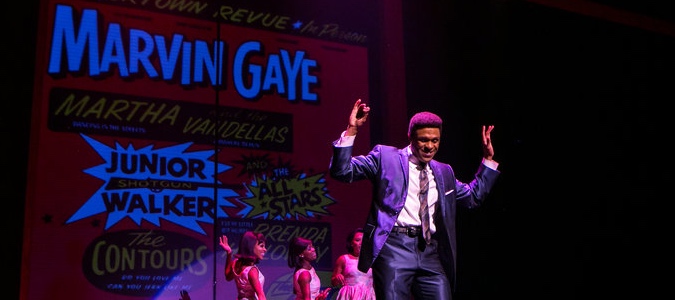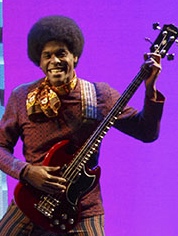

Motown: The Musical
Opening Night: July 12, 2016
Closing: July 31, 2016
Theater: Nederlander Theatre
Motown the Musical is the real story of the one-of-a-kind sound that hit the airwaves in 1959 and changed our culture forever. This exhilarating show charts Motown founder Berry Gordy’s incredible journey from featherweight boxer to the heavyweight music mogul who launched the careers of Diana Ross, Michael Jackson, Stevie Wonder, Smokey Robinson, Marvin Gaye and so many more. Featuring all the classics you love, Motown the Musical tells the story behind the hits as Diana, Smokey, Berry and the whole Motown family fight against the odds to create the soundtrack that changed America. Motown shattered barriers, shaped our lives and made us all move to the same beat. Now, experience the next electrifying chapter in the Motown story.
BUY TICKETSREAD THE REVIEWS:
July 21, 2016
“What’s going on?” When Jarran Muse, playing Marvin Gaye, sings those words and a verse or two of the song they come from in “Motown: The Musical,” which has opened at the Nederlander Theater in a limited return engagement, they carry an unsettling relevance they did not have when the show originally opened more than three years ago. A celebratory musical paying tribute to the black music explosion led by Berry Gordy’s Detroit label, “Motown” devotes only a few scenes to the civil rights movement and the tumult of the late 1960s. But they give it a new and unusual relevance after more than a year of troubled race relations, with many commentators drawing comparisons (and others making distinctions) between now and then. By no means has “Motown” been transformed into a thoughtful or probing musical. Under Charles Randolph-Wright’s direction, it remains what it was: a sparkling and enjoyable, if lumpy, journey through 25 years of Motown history. It’s just that the climax of the first act, and the opening minutes of the second, give the show a jolt of emotional currency that contrasts strikingly with its nostalgic spirit. The central roles have been recast, with excellent singing actors who are mostly equal to the fine originals. As Gordy, Chester Gregory could use more intensity to illuminate the relentless — some would say ruthless — drive of the man who helped usher in a pop-music revolution. But he brings some nice nuances to the role, accentuating Gordy’s brooding grievance as the stars he created begin to desert him. (Mr. Gordy himself wrote the musical’s book.) As Diana Ross, Gordy’s love interest and one of his biggest discoveries, Allison Semmes, who understudied the role in the show’s first go-round (and played the famously ousted Supreme, Florence Ballard), exudes a mixture of calculating ambition and youthful naïveté, coquettishly keeping an eye on the main chance even as a teenager. Her singing evokes the cotton candy purr of Ms. Ross’s, without being mere vocal mimicry. And, at the performance I saw, Ms. Semmes revealed a nimbly funny way with audience interaction during the “Reach Out and Touch” number. Jesse Nager’s honeyed tenor is a perfect match for Smokey Robinson, one of Gordy’s strongest allies and early stars. Mr. Muse finds the fiery rebellious streak that emerges as Gaye finds his voice and sometimes finds himself in conflict with his boss. And as the young versions of Gordy, Little Stevie Wonder and, most spectacularly, Michael Jackson during the Jackson 5 years, Leon Outlaw Jr. proves a ferocious little dynamo, tearing up the house with his exuberance. (J. J. Batteast alternates in these junior roles.) “Motown” has so much story to tell — Mr. Gordy clearly feels a highlights reel of his career could go on forever — that there’s no time for dramatic subtlety or complexity of character. But who’s coming to see “Motown” for anything other than the fabulous songbook? (The more than 55 titles is surely a record for a jukebox musical.) True, some of your favorites may be shortchanged, or used somewhat awkwardly as “book” songs. But there’s so much music pouring from the stage that Motown fans probably won’t complain when the needle skips to the next track before they have had a chance to savor the last fully.
READ THE REVIEW


















